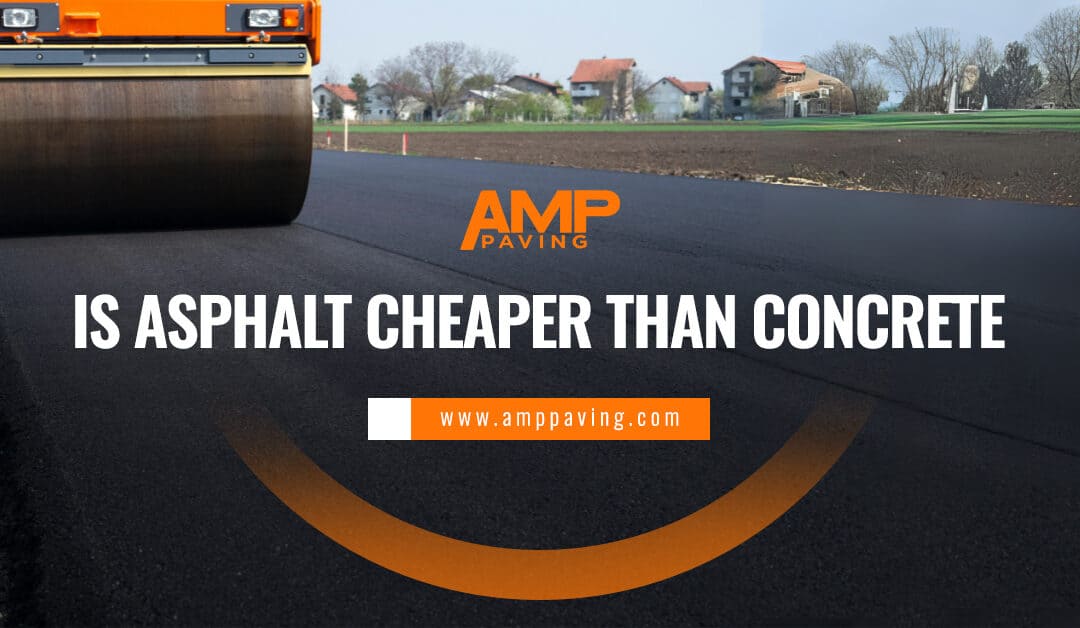When deciding on the right paving material for your project in South Carolina, the choice often comes down to asphalt or concrete. Both materials have unique benefits and drawbacks, making it crucial to understand their differences. But is asphalt cheaper than concrete?
Let’s look at the cost, durability, and aesthetic appeal of each, helping you make an informed decision. Whether you’re paving a driveway, parking lot, or roadway, knowing the cost factors can significantly impact your project’s budget and outcome.
Understanding Asphalt
Asphalt is a popular choice for paving in South Carolina and beyond. It’s made from a mixture of aggregate, binder, and filler, creating a flexible and durable surface.
In South Carolina’s climate, asphalt’s flexibility makes it resistant to cracking during temperature fluctuations. It’s quick to install and ready for traffic almost immediately, a key advantage for time-sensitive projects. Asphalt also offers noise reduction, a smoother ride, and is typically less expensive upfront than concrete.
Additionally, its dark color aids in melting snow faster, an advantage during the rare snowy and icy days in the state. These features make asphalt a top contender for many paving projects.
Exploring Concrete
Concrete, another widely used paving material, consists of cement, water, and aggregates like sand and gravel.
While concrete typically has higher initial installation costs compared to asphalt, its durability can lead to lower long-term maintenance expenses. However, repairs on concrete can be more complex and costly.
Understanding the cost is crucial when considering concrete for your paving needs.
Cost Comparison: Asphalt Driveway vs Concrete Driveway
When comparing the cost of a concrete driveway to an asphalt driveway, it’s crucial to look beyond the initial installation cost.
For a concrete driveway, the upfront cost is higher compared to asphalt. Concrete driveway costs per square foot can vary depending on the complexity and design choices.
On the other hand, an asphalt driveway typically has a lower initial cost, making it an attractive option for those with budget constraints.
However, you’ll want to consider other costs.
Maintenance Costs
A concrete driveway usually requires less maintenance over its lifespan. It doesn’t need as much sealing or regular maintenance as an asphalt driveway. Asphalt needs regular (every 2-3 years) sealcoating to prevent cracks and weather damage.
However, proper maintenance of both driveway materials is essential to extend their lifespan. For concrete driveways, fixing cracks and removing oil stains can add to the maintenance costs.
Asphalt driveways may need more frequent attention to address issues like cracks or softening in high temperatures. However, with regular maintenance, asphalt driveways are less likely to suffer from these problems.
Cost per Square Foot
The cost per square foot for each material also depends on the condition of the existing driveway and the complexity of the driveway installation process. For new driveways or replacing an existing driveway, the total cost can be influenced by factors like the size of the driveway, geographic location, and the cost of labor in South Carolina.
However, asphalt driveways are generally much less expensive for your initial cost and continue to stay low-cost with proper maintenance.
If you want the cheaper route, consider talking with a local asphalt contractor. They can often offer a free quote and give you an idea of how much your costs will be over time after the initial installation cost.
Durability and Longevity: Concrete Driveways vs Asphalt Driveways
The durability and longevity of your driveway are crucial factors to consider when choosing between concrete and asphalt. Concrete driveways are known for strength and the ability to withstand heavier loads, making them a durable material for long-term use.
In South Carolina’s climate, concrete’s resistance to intense sunlight adds to its lifespan, which can extend for decades with proper installation and maintenance. However, without care, plants and tree roots or falling debris can crack concrete driveways, leaving them in shambles.
Asphalt driveways can last decades also, with proper maintenance. And they offer significant durability. There’s a reason the roads are asphalt and not concrete. Its flexible material allows it to adapt to weather conditions, reducing the likelihood of cracking in fluctuating temperatures.
Both types of driveways can suffer damage in cold weather. Concrete might crack in freezing temperatures, while asphalt can become brittle in cold climates. Regular maintenance is key for both materials to prevent these issues. For asphalt, this includes sealcoating to protect against weather damage. For concrete, using sealers to prevent moisture penetration is crucial, along with fixing cracks promptly.
In terms of resale value, a well-maintained driveway, whether concrete or asphalt, can enhance the curb appeal of your property. The right material for your driveway should align with your long-term goals, considering both the immediate and future needs of your property.
Proper installation and regular maintenance are vital for maximizing the lifespan of either material, ensuring that your driveway remains functional and attractive for years to come.
Environmental Considerations: Asphalt and Concrete
When evaluating the environmental impact of asphalt and concrete driveways, several factors come into play.
Asphalt, primarily made from petroleum products, might raise concerns about eco-friendliness. However, asphalt is recycled is a significant advantage. Recycled asphalt can be used in new asphalt pavement, reducing the need for new materials and minimizing waste. Additionally, most asphalt mixes now include recycled materials like rubber or recycled glass, enhancing their eco-friendliness.
“Asphalt is the pavement of choice for sustainability. Asphalt is 100 percent reusable and recycled at a higher rate than any other material in America— including soda cans and newspaper. In fact, 94 percent of asphalt reclaimed from old roads and parking lots goes back into new pavements.”
Concrete, on the other hand, is a mixture of cement, water, and aggregates. While it does not use petroleum products, the production of cement, a key component of concrete, is energy-intensive and contributes to carbon emissions. Innovations in concrete production, including the use of supplementary cementitious materials, are helping to reduce its environmental impact.
Proper maintenance plays a role in environmental sustainability as well. Well-maintained driveways, whether asphalt or concrete, last longer, reducing the frequency of replacement and the associated environmental impact.
For instance, proper sealing and repair of asphalt driveways can extend their lifespan, while concrete driveways require less frequent but more intensive maintenance to keep them in good condition.
Ultimately, the choice between an asphalt or concrete driveway involves balancing various environmental considerations. Take factors like the availability of recycled materials and maintenance practices into account before making a choice that aligns with your environmental values and practical needs.
Making the Right Choice for Your Project: Asphalt or Concrete Driveway
Deciding whether to install an asphalt or concrete driveway in South Carolina involves considering several factors tailored to your specific needs and circumstances.
Here are key aspects to keep in mind:
1. Project Budget
Assess your available budget for both initial installation and long-term maintenance.
2. Climate Considerations
Think about South Carolina’s climate and how it affects driveway materials. Asphalt’s flexibility makes it better suited for areas with temperature fluctuations, while concrete’s durability is advantageous also.
3. Aesthetic Preferences
Determine the look you desire for your driveway. Concrete offers a range of decorative options and finishes, enhancing curb appeal and potentially increasing property value. Asphalt provides a classic, clean look but with fewer customization options.
4. Maintenance Commitment
Consider the level of maintenance you’re willing to commit to. Asphalt driveways require more regular upkeep, including sealing and repairing, while concrete driveways need less frequent but sometimes more intensive (and expensive) repairs.
5. Environmental Impact
Evaluate your environmental priorities. If recycling and reducing petroleum product use are important to you, asphalt’s recyclability might be appealing.
6. Longevity and Durability
Think about how long you plan to use the driveway and what kind of traffic it will endure. Consider whether you will take care of your new driveway material. With asphalt driveways, you’ll need regular maintenance. With concrete, you may need less maintenance, but the costs may be higher when you do need repairs.
7. Resale Value
If you plan to sell your property in the future, consider how the type of driveway might impact its value. A well-maintained and aesthetically pleasing driveway, whether asphalt or concrete, can boost the property’s appeal to potential buyers.
By carefully weighing these factors, you can make an informed decision on whether an asphalt or concrete driveway is the right choice for your project in South Carolina. Consulting with paving professionals can also provide valuable insights tailored to your specific situation.
AMP Paving For Your Driveway and Parking Lot Projects
At AMP Paving, we proudly serve the greater Columbia, South Carolina region with top-notch paving solutions. Our team of experienced professionals is dedicated to providing quality service for both residential and commercial projects.
We understand the unique climate and environmental factors of South Carolina and how they impact paving materials. Our services include detailed consultations ensuring durability, cost-effectiveness, and aesthetic appeal for a new driveway installation or other project.
We take pride in our craftsmanship and use only the highest-quality materials for every project. From the initial design to the final installation, our focus is on delivering excellence and customer satisfaction.
We offer a range of paving services, including new driveway installations, replacements, crack repairs, and seal coating. At AMP Paving, we also prioritize eco-friendliness in our processes, recommending sustainable options whenever possible.
Your driveway is more than just a path to your home or business; it’s a vital part of your property’s functionality and curb appeal. Choose AMP Paving for a reliable, professional, and environmentally conscious approach to your paving needs.
Contact us today to discuss your project and discover why we’re a trusted name in the Columbia region for all paving projects.

